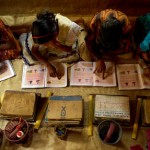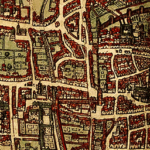global war on poverty
The 2014 documentary Poverty Inc. demonstrates at the very first beginning why transnational aid does not essentially get transformed and work despite superficial changes in modality. As Machiavelli said, power belongs to those who lose instead of gaining from changes. Under a neoliberal global system, with issue of ‘development’ emphasized, hidden behind the good hearts of giving and mobilization of giving stands the ideology of paternalism. Paternalist pride of ‘white saviors’ is rooted in apparently benevolent aiding ‘with no strings attached’.
The perfect gift ideology assumes that the receiver is free from obligations (to pay back) and that the gift is immaterial. Tension is embodied firstly in mutual transformation of gift and commodity as two ends of form of object existence, secondly in persons as ostensibly free subjects and simultaneously social beings carrying interpersonal responsibilities (Carrier, 1990, p. 19). This relation becomes more morally disputed and politically involved when the ‘gift’ is transacted at national level.
From Mauss’ perspective, only the western economy creates utilitarian animals. Reciprocity based on the three intercorrelated obligations of giving, receiving, and repaying an approximately equivalent/appropriate return (even a ‘forget it’ or sorry’) determines that there would be no free gifts. However, with regards to the tit-for-tat perspective, even politeness is inherently motivated by self-interest. The internal spirit of objects reminds us of modern Halloween and Christmas spirits, where giving is expected; or in weekend birthday parties where all class children gather to exchange gifts and ‘treat bags’ (Wilk & Cliggett, 1996, p. 153). As well, in terms of ethnocentric critique, it is suggested that even Mauss himself is applying westernized terminologies to interpret gift ‘primitive’ economy–can we apply our ideal form of consumption to universality? The perfect gift of ‘free aid’ intensifies commercial competition, putting local products at a more disadvantaged place. Admits Carrier, ‘the assertion that the perfect gift is unconstrained and unconstraining is as much a denial as is the assertion that the material aspect of the gift is insignificant’ (1990, p. 27). However ambivalent their obligations may seem, American culture attaching great significance to individualistic freedom still witnesses its social networks constraining the moral persons (Ibid.). In this logic, gifts and commodities are mutually fluid and interchangeable in a diversity of societies and social stages. They can be vibrant and significant as much as they can be vulnerable, evanescent, and precarious. Money does not constitute an impersonal common denominator; production and consumption always embody more or less sociality and delicate characteristics of different individual agents, with shared values of self-accomplishment and altruism.
When we look back at the global war on poverty, as anthropologists, an advantage of our emic ‘scientific irrelevance’ is to implement more local research to explore how ‘the poor’ cope with poverty: what they know, what they want or do not want on the surface, what they expect of themselves and others, and how they make choices. As Banerjee & Duflo (2011) questioned in Poor economics: A radical rethinking of the way to fight global poverty, does foreign aid start a virtuous circle or simply just stop people from finding their own solutions to problems and corrupting local machines? There exists omnipresent ignorance and inertia among experts, aid workers and local policy makers; inert thinking cannot realize the dream of ‘making the world a better place’, which in Foucault’s word are no more than immediate struggles on the direct, closest institutions but not revolutions. There are a large range of easy fruits to pick: vaccines, mosquito nets, oral rehydration solutions, running water, disinfectants (expensive treatment is not comparable with cheap prevention)… the ladders to escape from the ‘poverty trap’ are most of the time put in the wrong place, and people don’t seem to know how to step on them, or they don’t even want to. Lack of information, weak beliefs, procrastination; the difference between us and the poor is actually very small, the advantage lies in what we get intangibly, with little need to use our limited self-control and decisiveness. High absenteeism, lack of motivation, and fragility to psychological sunk costs of government health care providers, just to name a few. It’s easy to denounce the dangers of paternalism and tell ourselves that we are responsible for our own lives: we are so entrenched in the system that we don’t even realize it (Banerjee & Duflo, 2011). This is not fundamentally different from those who claim to be morally good-intentional but judge safety and quality of infrastructure based on racial segregation; acknowledging it or not, we are all complicit in the corrupted system.
Contributed by YiranLiu on 24/01/2023






